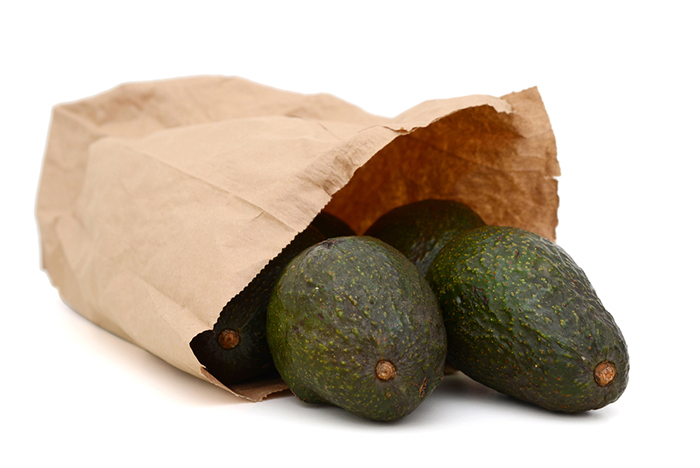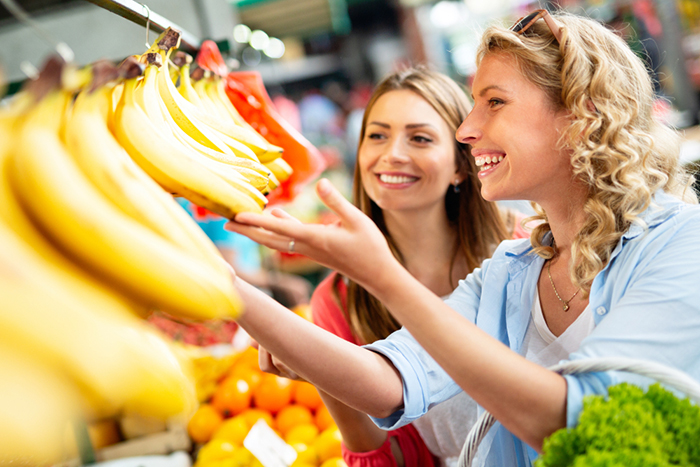
When it comes to picking out fruits and veggies at the grocery store, most people know the basics: slightly greener bananas will ripen slowly at home, ripe avocados should be semi-firm (with a little give when pressed), and so on. As a general rule, shoppers look for colorful, fragrant, bruise-free produce. While Pete’s Market meets and exceeds this standard for our customers, we like offering more than you expect. That’s why we’ve compiled this short list of pro-tips that aren’t necessarily common knowledge.
“Top-of-the-Pile” Corn is Sweeter
Warm temperatures can diminish the sweetness of corn, so be sure to take from the top of the bin when shopping for ears in the produce section. Better yet, take advantage of pre-shucked corn on the cobb in the fresh refrigerated area of your local Pete’s Market. It costs a little more, but it’s hassle-free and climate controlled for maximum flavor.

Deflated Bags of Lettuce Last Longer
When shopping for pre-washed bags of lettuce, go for the ones with as little air inside as possible. A puffier bag indicates that the lettuce inside is riper, and won’t last as long in your refrigerator.
Leftover lettuce in the bag (or any bag) will last longer if you drop in a dry sheet of paper towel before sealing. This will absorb moisture inside the bag, keeping it away from your lettuce for prolonged freshness.
Ugly Fruit Marks Aren’t All Bad
Dark spots on a peach aren’t necessarily bruises. Some indicate an area where the sun caused an abundance of sugar to collect, causing a darker patch on the skin. This means the peach is going to be riper and more flavorful. Peaches with a puffy, dented stripe where the stem used to be is also a good sign. It means that you’re holding a ripe, juicy fruit that swelled up against its branch before it fell.

Watermelons with big, pale spots from sitting on the ground are actually the best of the bunch! The mark usually means that the fruit was allowed to ripen on the vine for an appropriate amount of time. The spot shouldn’t be mushy, of course, but if it’s otherwise firm you’re good to go. Also, when a watermelon seems heavier than it should (for its size), that means it’s super-juicy on the inside.
For other melons like cantaloupe and honeydew, a withered stem (still partially attached) similarly indicates a more ripened, delicious fruit.
Control Your Fruit’s Raging Hormones
Want to ripen bananas and avocados faster? Stick ‘em in a basic, brown paper bag, roll it closed, and leave it on the kitchen counter. A good number of fruits emit a hormone called ethylene as they naturally ripen. Trapping that ethylene gas around the fruit will speed up the process. Also known as “climacteric” fruits, some other popular ethylene-producing produce that will quick-ripen in a paper bag are apples, peaches, pears, prunes, kiwi, mangoes, plums, and even tomatoes (which are, botanically-speaking, a fruit).

Conversely, many vegetables are adversely sensitive to ethylene. Lettuce, broccoli, green beans, cauliflower, cucumbers, peppers, and carrots actually absorb ethylene (to their detriment). Ever wonder why some refrigerators have a special drawer for vegetables? It’s partly to help prevent your ripening fruits from ruining your fragile veggies.
Your Fruit Bowl is on a Timer
Keeping apples, oranges, and bananas on display in your kitchen adds a lovely visual and puts healthy food choices within easy reach for your family. But mixing the fruit and storing it all at room temperature may accelerate the ripening faster than desired. If you want to get the most out of your produce, store your apples and oranges in the refrigerator.
Put Your Asparagus in a Vase
For longer-lasting asparagus, chop off the ends and arrange them in a vase or tall jar (as you would flowers). Be sure there’s an inch or two of water in the jar, then cover the tips with a plastic bag. As long as you’re sure the spears won’t fall over (and you replace the water once or twice), your asparagus contraption should extend its freshness for up to a week!

Giving Celery Back its Mojo
Limp celery? It happens… but it’s easy to fix! Place the stalks in a glass of water after trimming off the ends, then store the glass in the fridge. It’ll soon become crisp again. For longer-term celery maintenance, try loosely wrapping the stalks in aluminum foil before refrigeration.
Wait to Wash
The FDA says that clear tap water is just fine for washing your at-home produce, but wait until you’re ready to eat before washing. Pre-washing all of your fruits and veggies as soon as you get home from the store actually reduces their freshness. You’ll get more for your money if you only wash what you need, when you need it.

Highly trained buyers and produce specialists have created an exceptional environment at Pete’s Market: one that gives consumers a bounty of options and premium, top-quality selections. As a result, shopping in our stores can be a delightful and inspiring experience! We welcome you to stop by any of our Chicagoland stores and experience the difference firsthand.



